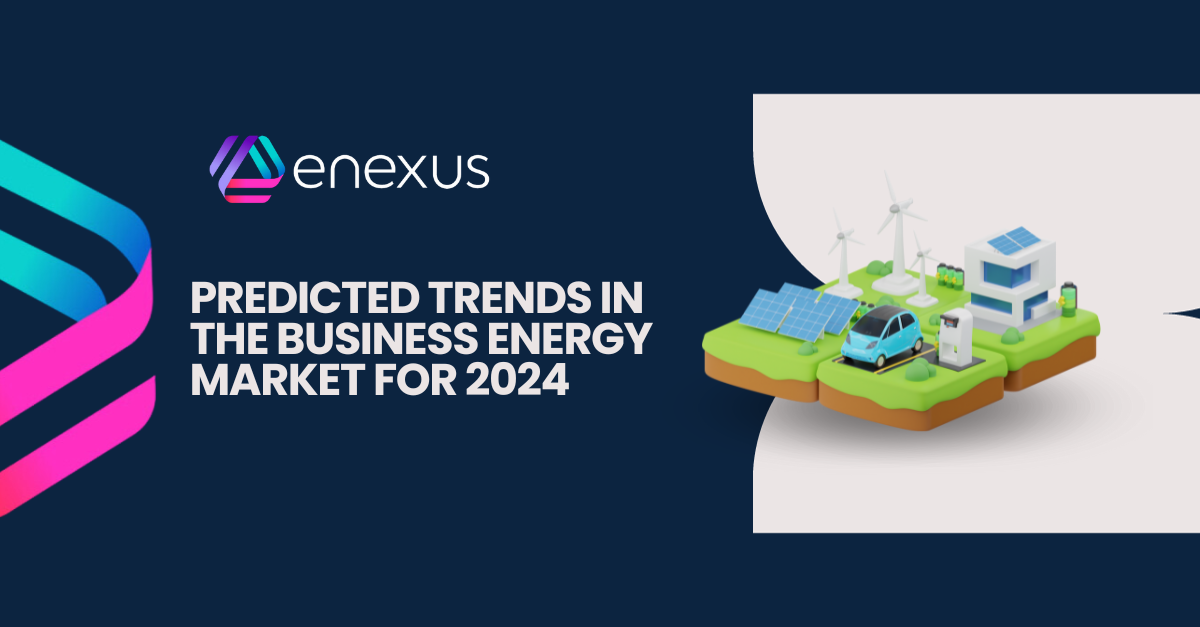Business Energy Market 2024 – Predicting future trends
The business energy market is ever-evolving, driven by technological advancements, regulatory changes, and the growing global emphasis on sustainability.
As we step into 2024, several key trends are anticipated to shape the landscape of the business energy sector. From renewable energy adoption to the integration of advanced technologies, businesses are expected to witness transformative changes…
- Rapid Transition to Renewable Energy:
One of the most prominent trends in the business energy market for 2024 is the accelerated shift towards renewable energy sources. The mounting concerns over climate change, coupled with the decreasing costs of renewable technologies, are driving businesses to embrace cleaner and more sustainable energy alternatives. Solar and wind energy, in particular, are expected to play a pivotal role in meeting the escalating demand for eco-friendly power solutions.
Energy Storage Solutions:
As renewable energy sources become increasingly prevalent, the need for efficient energy storage solutions becomes paramount. In 2024, businesses are anticipated to invest heavily in advanced energy storage technologies, such as batteries and grid-scale storage systems. These solutions not only address the intermittency issues associated with renewable sources but also provide businesses with greater control over their energy consumption patterns.
Smart Grid Integration:
The integration of smart grid technologies is poised to gain significant traction in the business energy market during 2024. Smart grids leverage digital communication and control systems to optimise the generation, distribution, and consumption of electricity. This results in improved efficiency, reliability, and resilience of the energy infrastructure. Businesses are expected to adopt smart grid solutions to enhance energy management, reduce operational costs, and minimise environmental impact.
Decentralised Energy Systems:
Decentralisation is emerging as a key theme in the business energy sector, with businesses seeking to reduce dependence on centralised power sources. Distributed energy resources, such as on-site solar panels, combined heat and power (CHP) systems, and microgrids, allow businesses to generate and manage their energy locally. This trend not only enhances energy resilience but also provides companies with greater control over their energy supply chain.
Focus on Energy Efficiency:
In 2024, businesses will intensify their efforts to enhance energy efficiency across operations. With energy costs being a significant operational expense, organisations will invest in energy-efficient technologies and practices to reduce consumption and improve overall sustainability. Artificial intelligence (AI) and data analytics will play a crucial role in optimising energy use by providing insights into consumption patterns and recommending efficiency measures.
Electrification of Transportation:
The business energy market is expected to witness a surge in the electrification of transportation fleets. As electric vehicles (EVs) become more mainstream, businesses will invest in charging infrastructure and explore opportunities to integrate EVs into their operations. This move not only aligns with sustainability goals but also contributes to reducing the carbon footprint associated with transportation.
Dynamic Pricing and Energy Market Participation:
Dynamic pricing models are anticipated to gain prominence in 2024 as businesses seek ways to optimise energy costs. With advancements in digital technologies, businesses can participate in real-time energy markets, adjusting their consumption patterns based on market conditions. This not only allows for cost savings but also facilitates the integration of a higher percentage of renewable energy into the grid.
Regulatory Emphasis on Sustainability:
Governments and regulatory bodies worldwide are increasingly focusing on sustainability and environmental responsibility. In 2024, businesses can anticipate stricter regulations aimed at reducing carbon emissions and promoting the use of renewable energy. Compliance with these regulations will not only be a legal requirement but also a key driver for companies looking to enhance their corporate social responsibility (CSR) profiles.
As businesses navigate the dynamic landscape of the energy market in 2024, embracing these predicted trends will be essential for staying competitive, achieving sustainability goals, and contributing to a cleaner and more resilient energy future. From renewable energy adoption to the integration of smart technologies, the business energy sector is on the cusp of transformative changes that promise a more sustainable and efficient future.
For advice, guidance and expert opinions you can contact our experienced energy advisors here – https://enexusenergy.co.uk/contact/
For more business energy market news, you can connect with us on LinkedIn.








